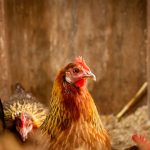Extreme heat can significantly impact chickens, affecting their health, behavior, and overall well-being. Chickens are particularly susceptible to heat stress due to their lack of sweat glands, relying instead on panting to regulate body temperature. When temperatures rise, chickens may experience heat stress, leading to decreased egg production, reduced feed intake, and potential mortality if not properly managed.
During periods of extreme heat, chickens may exhibit signs of distress such as panting, lethargy, reduced activity, and seeking out cooler areas in the coop or run. Egg production may decline, and egg quality may be compromised. Early detection of heat stress is crucial for preventing more serious health issues.
Chicken owners should be vigilant and observant of these signs, as understanding the effects of extreme heat on their flock allows them to take necessary steps to ensure the well-being of their chickens during hot weather. Proactive measures to mitigate the impact of extreme heat are essential for maintaining the health and productivity of the flock.
Table of Contents
- 1 Providing shade and ventilation for chickens
- 2 Offering cool treats and frozen treats for chickens
- 3 Keeping the water source cool and accessible for chickens
- 4 Adjusting feeding schedules for chickens during extreme heat
- 5 Monitoring chicken behavior and health during extreme heat
- 6 Creating a comfortable and safe environment for chickens in extreme heat
- 7 FAQs
Key Takeaways
- Extreme heat can cause stress, decreased egg production, and even death in chickens
- Providing shade and proper ventilation is crucial to help chickens regulate their body temperature
- Offering cool treats like watermelon and frozen treats like ice blocks can help chickens cool down
- Keeping the water source cool and accessible is important for hydration during extreme heat
- Adjusting feeding schedules to cooler times of the day can help reduce heat stress in chickens
- Monitoring chicken behavior and health is essential to identify signs of heat stress and take necessary action
- Creating a comfortable and safe environment with proper bedding and shelter is key to helping chickens cope with extreme heat
Providing shade and ventilation for chickens
Shade: A Key Element in Reducing Heat Stress
One of the most effective ways to help chickens cope with extreme heat is by providing ample shade in their coop and run. Shade can help reduce the direct exposure to sunlight and lower the ambient temperature, providing a cooler environment for chickens to seek refuge. This can be achieved by installing shade cloth or planting trees and shrubs around the coop and run to create natural shade.
Ventilation: Allowing Hot Air to Escape and Fresh Air to Circulate
Additionally, ensuring proper ventilation in the coop is essential for allowing hot air to escape and fresh air to circulate, helping to maintain a comfortable temperature for the chickens. In addition to providing shade, it’s important to ensure that the coop and run are well-ventilated to allow for proper air circulation. This can be achieved by installing windows, vents, or fans to facilitate airflow and reduce the buildup of heat inside the coop.
The Importance of Proper Ventilation in Preventing Heat Stress
Proper ventilation is essential for preventing heat stress and maintaining a comfortable environment for chickens during extreme heat. Providing shade and ventilation is crucial for helping chickens cope with extreme heat. By providing a cooler environment and allowing for proper air circulation, chickens can thrive even in the hottest temperatures.
Offering cool treats and frozen treats for chickens

During periods of extreme heat, offering cool treats and frozen treats can help chickens stay hydrated and cool down. Watermelon, cucumbers, and other fruits and vegetables with high water content can provide chickens with essential hydration while also offering a refreshing treat. Additionally, freezing fruits or vegetables such as berries or peas can create frozen treats that chickens can peck at to help lower their body temperature.
These cool treats not only provide hydration but also offer a source of enrichment for chickens during hot weather. In addition to cool treats, frozen treats can also be offered to chickens to help them cool down during extreme heat. Freezing fruits or vegetables such as berries or peas can create frozen treats that chickens can peck at to help lower their body temperature.
These frozen treats not only provide hydration but also offer a source of enrichment for chickens during hot weather. During periods of extreme heat, offering cool treats and frozen treats can help chickens stay hydrated and cool down. Watermelon, cucumbers, and other fruits and vegetables with high water content can provide chickens with essential hydration while also offering a refreshing treat.
Additionally, freezing fruits or vegetables such as berries or peas can create frozen treats that chickens can peck at to help lower their body temperature. These cool treats not only provide hydration but also offer a source of enrichment for chickens during hot weather. In addition to cool treats, frozen treats can also be offered to chickens to help them cool down during extreme heat.
Freezing fruits or vegetables such as berries or peas can create frozen treats that chickens can peck at to help lower their body temperature. These frozen treats not only provide hydration but also offer a source of enrichment for chickens during hot weather.
Keeping the water source cool and accessible for chickens
Maintaining a cool and accessible water source is crucial for ensuring that chickens stay hydrated during extreme heat. Providing multiple water stations in the coop and run can help ensure that all chickens have access to water at all times. Additionally, placing water containers in shaded areas can help keep the water cool and prevent it from becoming too warm in the sun.
Regularly refreshing the water and cleaning the containers is also important for ensuring that the water remains clean and inviting for the chickens. In addition to providing multiple water stations, adding ice cubes or frozen water bottles to the water containers can help keep the water cool during hot weather. This can encourage chickens to drink more frequently and stay hydrated, reducing the risk of heat stress.
By keeping the water source cool and accessible, chicken owners can help ensure that their flock remains hydrated and healthy during extreme heat. Maintaining a cool and accessible water source is crucial for ensuring that chickens stay hydrated during extreme heat. Providing multiple water stations in the coop and run can help ensure that all chickens have access to water at all times.
Additionally, placing water containers in shaded areas can help keep the water cool and prevent it from becoming too warm in the sun. Regularly refreshing the water and cleaning the containers is also important for ensuring that the water remains clean and inviting for the chickens. In addition to providing multiple water stations, adding ice cubes or frozen water bottles to the water containers can help keep the water cool during hot weather.
This can encourage chickens to drink more frequently and stay hydrated, reducing the risk of heat stress. By keeping the water source cool and accessible, chicken owners can help ensure that their flock remains hydrated and healthy during extreme heat.
Adjusting feeding schedules for chickens during extreme heat
During periods of extreme heat, it’s important to adjust feeding schedules for chickens to minimize heat stress and reduce digestive issues. Feeding chickens early in the morning or later in the evening when temperatures are cooler can help prevent them from overheating while consuming food. Additionally, offering smaller but more frequent meals throughout the day can help reduce metabolic heat production in chickens, allowing them to better cope with hot weather.
In addition to adjusting feeding schedules, it’s important to provide a balanced diet that includes electrolytes and vitamins to support overall health during extreme heat. Electrolytes can help replenish essential minerals lost through panting and sweating, while vitamins such as vitamin C can support immune function during periods of stress. By adjusting feeding schedules and providing a balanced diet, chicken owners can help ensure that their flock remains healthy and resilient during extreme heat.
During periods of extreme heat, it’s important to adjust feeding schedules for chickens to minimize heat stress and reduce digestive issues. Feeding chickens early in the morning or later in the evening when temperatures are cooler can help prevent them from overheating while consuming food. Additionally, offering smaller but more frequent meals throughout the day can help reduce metabolic heat production in chickens, allowing them to better cope with hot weather.
In addition to adjusting feeding schedules, it’s important to provide a balanced diet that includes electrolytes and vitamins to support overall health during extreme heat. Electrolytes can help replenish essential minerals lost through panting and sweating, while vitamins such as vitamin C can support immune function during periods of stress. By adjusting feeding schedules and providing a balanced diet, chicken owners can help ensure that their flock remains healthy and resilient during extreme heat.
Monitoring chicken behavior and health during extreme heat

Monitoring Behavior for Signs of Heat Stress
Observing changes in behavior such as increased panting, reduced activity, or seeking out cooler areas in the coop or run can indicate that chickens are struggling with the heat. Additionally, monitoring egg production and quality can provide insights into how well chickens are coping with extreme temperatures.
Regular Health Checks
In addition to monitoring behavior, regularly checking on individual chickens’ health is important for detecting any signs of illness or distress early on. This includes checking for signs of dehydration such as pale combs or lethargy, as well as ensuring that all chickens are eating and drinking normally.
Taking Proactive Measures
By closely monitoring chicken behavior and health during extreme heat, owners can take proactive measures to address any issues before they escalate. This can include providing additional shade, ventilation, and cooling measures to help keep their flock comfortable and healthy.
Creating a comfortable and safe environment for chickens in extreme heat
Creating a comfortable and safe environment for chickens during extreme heat is essential for ensuring their well-being and productivity. In addition to providing shade, ventilation, cool treats, and access to cool water, it’s important to minimize sources of stress that could exacerbate the impact of hot weather on chickens. This includes reducing disturbances in the coop or run, providing ample space for chickens to move around freely, and ensuring that nesting boxes are well-ventilated and free from excessive heat buildup.
Additionally, maintaining a clean environment by regularly removing soiled bedding and waste can help prevent bacterial growth and reduce odors that could further stress chickens during hot weather. By creating a comfortable and safe environment for chickens in extreme heat, owners can help minimize the impact of high temperatures on their flock’s health and well-being. Creating a comfortable and safe environment for chickens during extreme heat is essential for ensuring their well-being and productivity.
In addition to providing shade, ventilation, cool treats, and access to cool water, it’s important to minimize sources of stress that could exacerbate the impact of hot weather on chickens. This includes reducing disturbances in the coop or run, providing ample space for chickens to move around freely, and ensuring that nesting boxes are well-ventilated and free from excessive heat buildup. Additionally, maintaining a clean environment by regularly removing soiled bedding and waste can help prevent bacterial growth and reduce odors that could further stress chickens during hot weather.
By creating a comfortable and safe environment for chickens in extreme heat, owners can help minimize the impact of high temperatures on their flock’s health and well-being. In conclusion, extreme heat can have a significant impact on chickens’ health and productivity if not properly managed. Understanding the effects of high temperatures on chickens is crucial for taking proactive measures to mitigate its impact on their well-being.
Providing shade and ventilation, offering cool treats and frozen treats, keeping the water source cool and accessible, adjusting feeding schedules, monitoring chicken behavior and health closely, and creating a comfortable environment are all essential strategies for helping chickens cope with extreme heat. By implementing these measures, chicken owners can ensure that their flock remains healthy and resilient even during periods of hot weather.
If you’re looking for tips on how to keep chickens cool in extreme heat, you may also be interested in learning about the best design for a farmhouse chicken coop. Check out this article for helpful information on creating a comfortable and safe environment for your chickens.
FAQs
What are some signs that chickens are overheated?
Some signs that chickens are overheated include panting, holding their wings away from their bodies, reduced egg production, and lethargy.
How can I keep my chickens cool in extreme heat?
You can keep your chickens cool in extreme heat by providing plenty of shade, ensuring they have access to fresh, cool water at all times, using fans or misters to create a cooling breeze, and offering frozen treats such as fruits and vegetables.
What are some ways to provide shade for chickens?
You can provide shade for chickens by using natural shade from trees or shrubs, setting up tarps or shade cloths over their coop or run, or creating a covered area with a roof or awning.
How often should I change my chickens’ water in extreme heat?
In extreme heat, you should change your chickens’ water at least twice a day to ensure it stays cool and fresh. Adding ice to the water can also help keep it cool for longer.
Are there specific breeds of chickens that are more heat-tolerant?
Yes, some breeds of chickens are more heat-tolerant than others. Breeds such as Leghorns, Rhode Island Reds, and Sussex are known for their ability to handle hot temperatures better than breeds with heavier, denser feathers.
Meet Walter, the feathered-friend fanatic of Florida! Nestled in the sunshine state, Walter struts through life with his feathered companions, clucking his way to happiness. With a coop that’s fancier than a five-star hotel, he’s the Don Juan of the chicken world. When he’s not teaching his hens to do the cha-cha, you’ll find him in a heated debate with his prized rooster, Sir Clucks-a-Lot. Walter’s poultry passion is no yolk; he’s the sunny-side-up guy you never knew you needed in your flock of friends!







